
12 Apr, 2017
Door open for travel & tourism academia to boost research on “The Other Global Warming”
Bangkok – The Malaysia-based Global Movement of Moderates Foundation and the Institute of Asian Studies, Chulalongkorn University, have signed an MoU to expand academic research in “religious moderation” as a universal force for peace, shunning all forms of extremism, nationalism and absolutism.
Signed on April 5 at a conference designed to promote exactly that agenda, the MoU opens a door for travel & tourism academics to expand their focus beyond the current crop of mundane topics and promote the linkage between tourism and religions as forces of peace and moderation rather than division and conflict.
Religion, faith and spirituality lie at the heart of Asian heritage, but their role in travel & tourism has been relegated to that of physical icons deserving of superficial admiration, with no deeper introspection. That can now be changed. (Read the Editor’s Comment here).
The conference, the first of its kind held in Thailand, was co-organised by the Institute of Asian Studies, the Muslim Studies Centre, Global Movement of Moderates Foundation, Wasatiyyah Institute for Peace and Development of Thailand and the Chula Global Network.
Although it was designed to highlight an Islamic approach to moderation, the opening speaker, Asst Prof Dr. Pirongrong Ramasoota, Vice President for Social Outreach and Global Engagement at Chulalongkorn Univ, stressed that extremism was not just an Islamic issue.
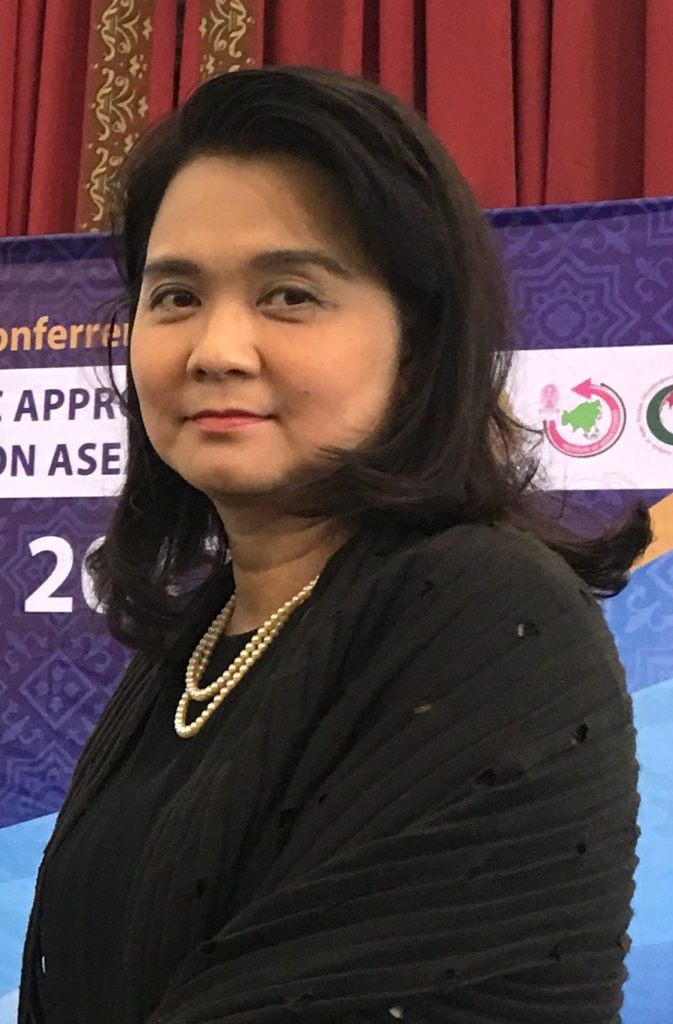 Asst Prof Dr. Pirongrong Ramasoota |
Dr Pirongrong, a former journalist who holds a Ph.D. in Communication Studies from Simon Fraser University, Canada, and a Masters degree in Communications from the University of Hawaii at Manoa, said, “The world is now at a crossroads, faced with rising nationalism, conflicts and a great deal of misunderstanding which is often propelled not only by long-existing bias but also political interests.”
She said that all forms of global extremism, whether its ultra-nationalists or religious extremists, “seem to function in a way that mutually support one another.”
While the Islamic extremist group ISIS is one such group, others such as the 969 movement in Myanmar claims itself as a “true Buddhist group” and American extremist group Ku Klux Klan identifies itself as Christian. Along with rightwing political groups in Europe and Asia, “they are all uniquely supremacist in nature and causing divisions, animosity and destruction.”
She also warned about religious extremists seeking to get their agenda into mainstream national discourse, as follows:
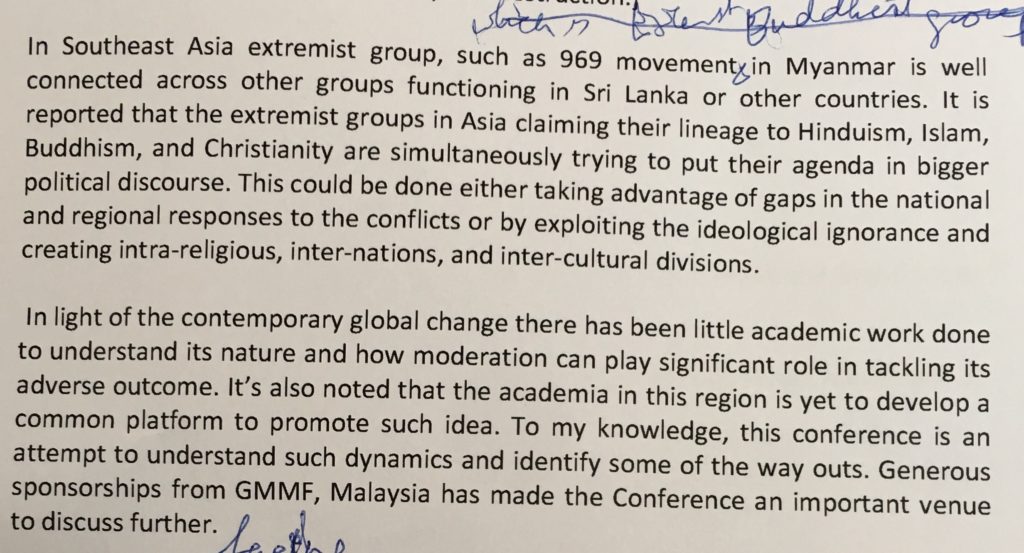
The opening keynote speaker, Prof. Dr. Jaran Maluleem, Chief Advisor of the Scholar Networks for Peace, noted that it is need of the hour “to create a conducive environment where each faith-based group can understand each other for a better functioning and peaceful society.”
Citing the fact that all religions have more in common than differences, he said, “It’s only the misunderstanding that allows to see diversity as differences. Let’s overcome these limitations.” Academics can play a major role in bringing clarity of thought to this process, he added.
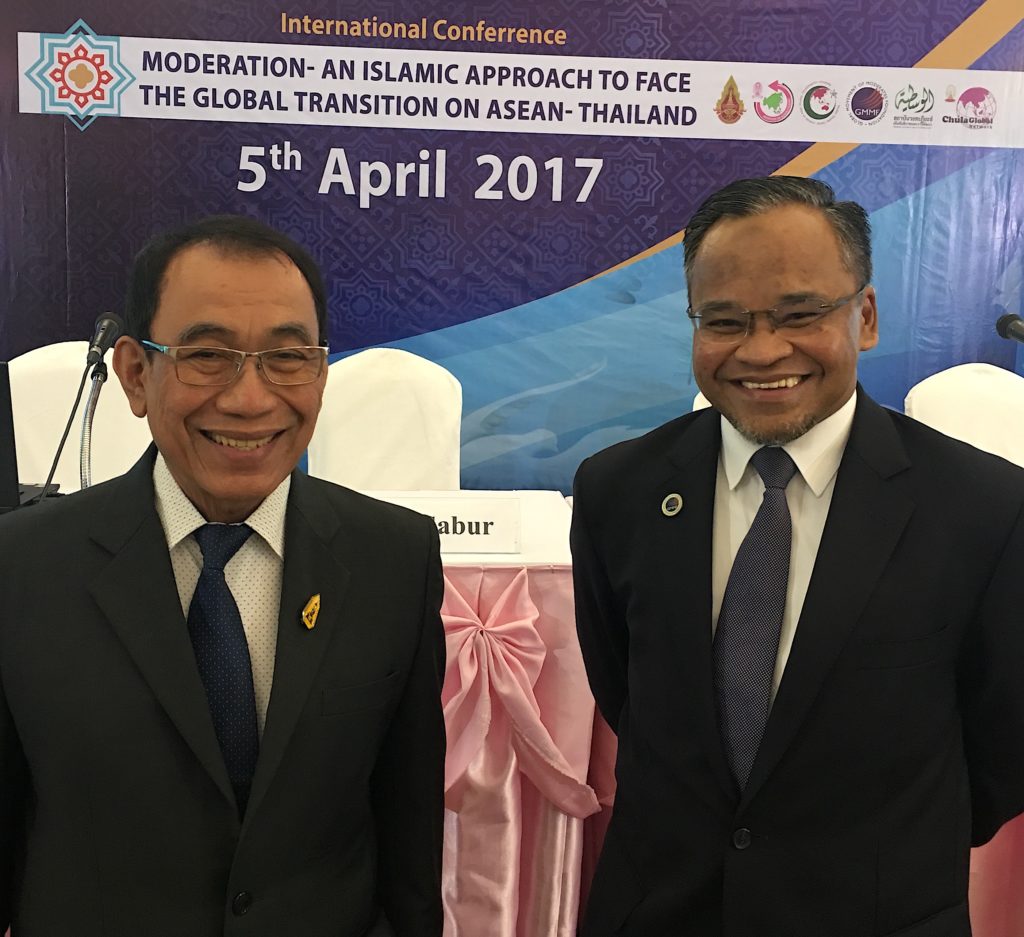
Prof. Dr. Pakorn Priyakorn, Director, Halal Standard Institute of Thailand and Dr. Nasharudin Mat Isa, Executive Chairman and CEO, Global Movement of Moderates Foundation
Another speaker, Dr. Nasharudin Mat Isa, Executive Chairman and Chief Executive Officer, Global Movement of Moderates Foundation, said, “A terrorist, whatever its propensity – be it Muslim, Buddhist, Hindu or Christian – should always be identified and condemned as a terrorist – and never by his or her religious affiliation.
“At the other end of the spectrum, there are sects of people who seek to define and promote Islam and its terminologies according to their own whims and desires, forgoing the true and correct disciplines of Islamic knowledge. These two sets of extremes has also given birth to the clash of confusion, between Arabisation and Islamisation. There needs to be a differentiation between the two, in order for peaceful coexistence to take place.”
Click here to download the full text of his speech.
Former Thai foreign minister Dr Surin Pitsuwan, also a former ASEAN secretary-general, said that moderation meant restraining oneself from thinking that “my opinion is the only one that is correct. Such absolutism reflects the narrowness of the mind rather than the openness of the intelligence.”
He said those who have an absolutist mindset are out of sync with the tremendous diversity of ASEAN, the appreciation of which requires mutual respect and mutual understanding. He too warned against the “Arabisation of Islam” noting that there were more Muslims in Asia than in the Arab world and that Islam had taken root in Asia alongside other indigenous traditions.
Calling for an “accommodation of civilisations, not a clash of civilisations,” he echoed the views of Asst Prof Pirongrong in noting that Islam did not have any monopoly on terrorism. “All forms of terrorism and extremism are symptoms of maladjustment to the changing global environment,” he said.
Mr. Abdus Sabur, Secretary-General, Asian Resource Foundation, said that all forms of conflict only benefit the global military establishment, with “no end to expenditure on arms and equipment.”
Prof. Dr. Pakorn Priyakorn, Director, Halal Standard Institute of Thailand, cited the failure of the “war on terror” in the 16 years since 9/11. He called for the creation of a “new USA” which he called the “United States of Asia and ASEAN” and questioned the increasing travelling restrictions placed on citizens of a number of Muslim-majority countries by the U.S. Trump Administration.
More such events are planned in future.
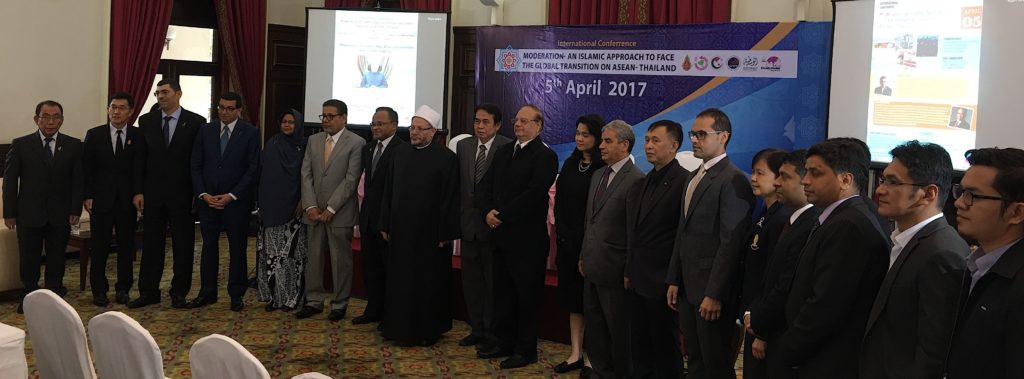
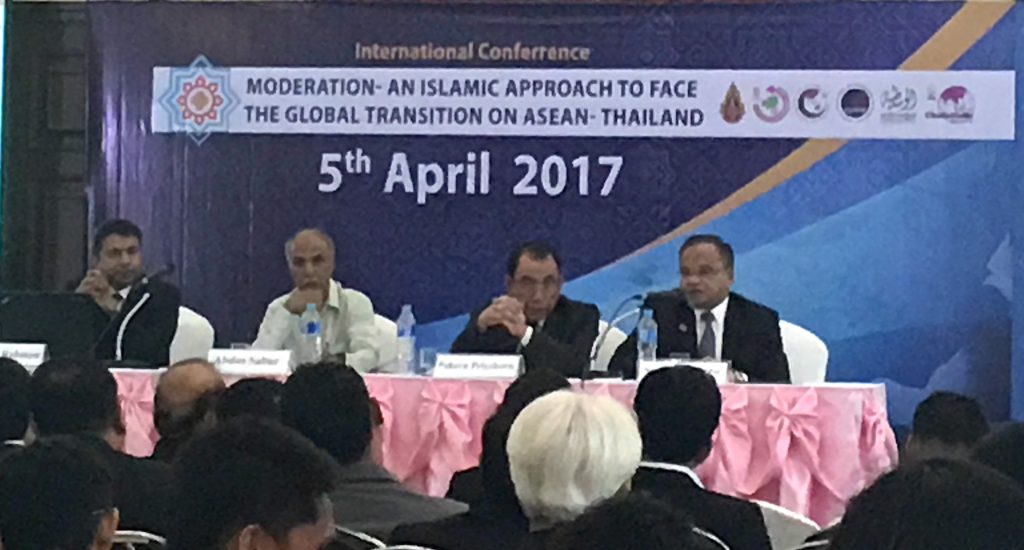
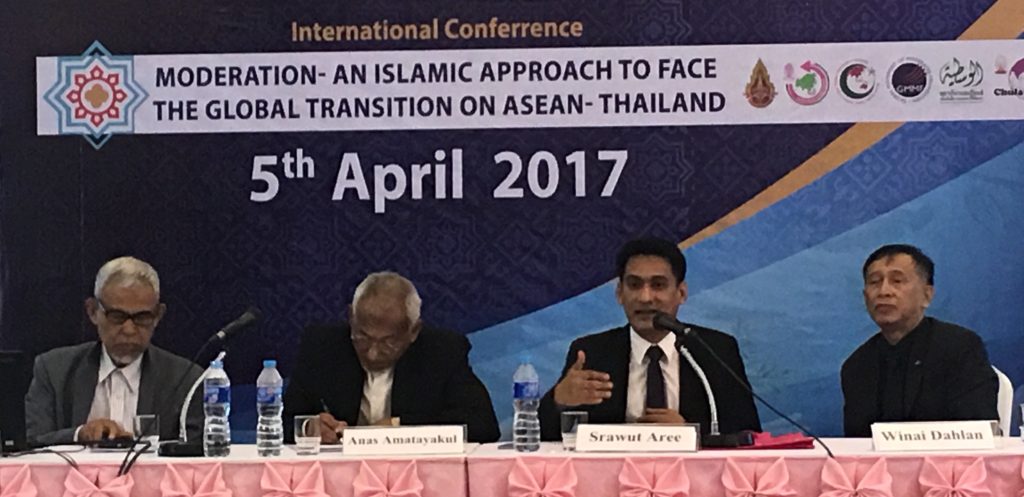
=========
Editor’s comment
Religion, faith and spirituality have been an intrinsic part of the Asian DNA for centuries. They play an equally important role in the DNA of the travel & tourism industry.
No trip to Thailand is complete without a visit to the Temple of the Emerald Buddha, to Cambodia without a visit to Angkor Wat, to Indonesia without the temples of Borobudur, to Brunei without the Sultan Omar Ali Saufiddin mosque, to the Philippines without the Church of Santo Nino.
Although places of worship are icons of this rich history and heritage, visitors are treated to grand explanations of the “hardware” without much understanding of the “software”. Thus, the primary role of all religions as promoters of peace, harmony and stability remains unfulfilled.
If travel & tourism claims to be an industry of peace, it is a natural partner of all religions and faiths. When these supposed purveyors of peace indulge in aggressive, extremist competition for market share, the industry of peace becomes the first victim.
Many travel & tourism academics have done extensive research into the role of tourism and global warming. But I claim to be the first to warn the industry of peace about the rise of what I then called the “other global warming” — rising temperatures amongst peoples, cultures and ethnicities which would be even more damaging than rising temperatures in the atmosphere.
My warning was sounded at the “International Conference on Tourism, Religions and Dialogue of Cultures” organised by the UN World Tourism Organisation in Cordoba, Spain, 29-31 Oct 2007. I was the only travel industry journalist invited to both cover and speak at that historic event. The full text of my speech at the UNWTO conference can be found here.
Thereafter, the UNWTO organised the 1st International Conference on Spiritual Tourism for Sustainable Development in Ninh Binh Province, Viet Nam (Nov 2013) and the 1st UNWTO International Congress on Tourism and Pilgrimages in Santiago de Compostella, Spain (Sept 2014).
I am the world’s only travel industry journalist invited to speak at all the events. See my reports on each of them here:
In continued pursuit of that interest, I covered the April 5 conference at Chulalongkorn university, which was designed to set in motion an objective scholarly analysis of rising extremism of all ilks, not just Islam.
The impact of rising religious extremism on travel & tourism has yet to figure on the agendas of global industry conferences which are still stuck on the traditional global warming and its first cousin, “safety & security”, which is basically the consequence of conflicts caused by “the other global warming.”
Travel & tourism prefers to avoid discussing the “other global warming” because it involves geopolitical issues and arouses controversy. But just as science proves that environmental global warming is a reality, so too does political science prove that the “other global warming” is also a hard-core reality.
To make a big hoop-la about tackling one global warming while sweeping the other global warming under the carpet is the height of irresponsibility and intellectual cowardice.
The Chulalongkorn university conference is a small step towards addressing that blind spot. Serious travel & tourism academics can now move forward with research on rising extremism of all ilks, provide insightful analysis for policymakers and conference organisers, and most importantly, contribute to the search for a solution.



Liked this article? Share it!